And David shepherded them with integrity of heart; with skillful hands he led them.
Psalm 78:72
 On April 28th, 1988, Aloha Flight 243 set off from Hilo, Hawaii, bound for Honolulu. It never arrived. As it reached its cruising altitude of 24,000 feet, suddenly the left side of the roof near the front of the plane ruptured then exploded off from the plane tearing a huge gap in the roof and damaging the right wing. Miraculously the Captain was able to perform an emergency landing at Kahului Airport on Maui but not before one flight attendant had been instantly sucked out of the place to her death and 79 passengers seriously injured.
On April 28th, 1988, Aloha Flight 243 set off from Hilo, Hawaii, bound for Honolulu. It never arrived. As it reached its cruising altitude of 24,000 feet, suddenly the left side of the roof near the front of the plane ruptured then exploded off from the plane tearing a huge gap in the roof and damaging the right wing. Miraculously the Captain was able to perform an emergency landing at Kahului Airport on Maui but not before one flight attendant had been instantly sucked out of the place to her death and 79 passengers seriously injured.
 Air Crash Investigators concluded that the crash was “caused by a breach in the aircraft’s integrity“. Their official NTSB report noted that Gayle Yamamoto, a passenger, noticed a small crack in the fuselage when boarding the plane but did not tell anyone. Maintenance workers had failed to insert several pop-rivets near the left side passenger door which had placed this small section under extraordinary pressure.
Air Crash Investigators concluded that the crash was “caused by a breach in the aircraft’s integrity“. Their official NTSB report noted that Gayle Yamamoto, a passenger, noticed a small crack in the fuselage when boarding the plane but did not tell anyone. Maintenance workers had failed to insert several pop-rivets near the left side passenger door which had placed this small section under extraordinary pressure.
This small breach in Aloha 243, was no more than a few centimetres long, but it was the basis for a breach in integrity. There is a life application here.
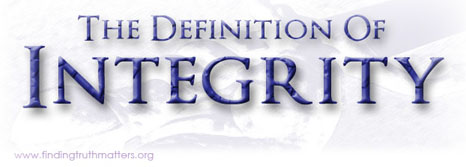
Integrity comes from the word: integer, which is the word used in mathematics to describe ‘a whole number’ (as distinguished from a fraction or number with a fraction). Being a person of integrity involves being a person who is one. They have one identity which is aligned with reality (the truth about themselves and the world in which they live). It is this latter aspect which makes moral uprightness (character) integral to integrity. When most people use the word integrity they are most often referring to this latter aspect to describe a person who is honest, trustworthy, and reliable. But this is more to do with character than integrity – although good character (moral uprightness) is an essential quality of integrity – integrity also involves the absence of any breaches.

And when he had removed him, he raised up David to be their king, of whom he testified and said, ‘I have found in David the son of Jesse a man after my heart, who will do all my will.’
Acts 13:22
King David is described as ‘shepherding Israel with integrity and skill’ (Psalm 78:79). But this description applies to David toward the end of a long process of becoming a man of integrity. It seems that God saw David’s potential to become an extraordinary man of integrity because his heart was soft before God. This was despite the Lord also seeing the existing breaches in David’s integrity. But the qualities of David’s heart, such as (i) humility, (ii) correctability, (iii) reverence for God, became the very qualities that enabled him to become whole – a man of integrity. These qualities are very close to God’s own heart. Thus, integrity in a person’s heart is, in one sense, the means by which a person can come close to God’s heart. David became such a man and earned the most honoured description as a man after God’s own heart – a description not given to any other man in the Scriptures. Here is an overview of David’s journey to integrity. We begin with his battle against Goliath which reveals both his heart and his integrity breaches which would need to be exposed, confronted and dealt with for him to become a man of integrity.

The scene is set with the Philistine’s champion, Goliath the Giant, challenging the nation of Israel to send a man to represent them to fight against him. No man is prepared to take up this challenge – not the least of all their king, King Saul. The young 16 year old shepherd-boy, David, is sent to the battle front to deliver supplies to his brothers. He hears that the king is offering riches, honour and his daughter to the man who will overcome Goliath. This piques David’s interest. But it also sheds light on what would later become the obvious small breaches in his integrity.
It is no mere cliché that the downfall of many a man has been the girls, the gold, and/or the glory. In essence, King Saul’s reward appealed to each of these human weaknesses. Yet, it was one of these rewards which particularly attracted David.
¶ Now Eliab his eldest brother heard when he spoke to the men. And Eliab’s anger was kindled against David, and he said, “Why have you come down? And with whom have you left those few sheep in the wilderness? I know your presumption and the evil of your heart, for you have come down to see the battle.”
First Samuel 17:28
When David arrived at the “battle”, his older brother, Eliab, exposed a deep wound in his youngest brother’s soul. Eliab shows his family’s scorn for David, and hints at David’s longing for acceptance (especially from older men) and his craving for female love. The offer of a bride to this emotionally deficient teenage boy appealed to David in a profoundly moving way – so much so that he was prepared to face Goliath the Giant to achieve it. Yet there is an equally as strong drive in David: his heart after God. While David’s weakness for women was a breach in his integrity (which would soon be painfully exposed), he is, in many ways, typical of all godly men who have a similar breach in their character: their 99% devotion to God looks to all like 100% devotion.
But David said to Saul, “Your servant used to keep sheep for his father. And when there came a lion, or a bear, and took a lamb from the flock, I went after him and struck him and delivered it out of his mouth. And if he arose against me, I caught him by his beard and struck him and killed him.
First Samuel 17:34-35
Integrity involves being fit for a particular purpose. Dr. Henry Cloud explains it this way-
“Let me explain with an analogy. If you are a general in the air force, and you need a new airplane built, you go see Boeing or someone like them and tell them that you want a new jet. They get a roomful of engineers together, and before they decide on what kind of material, or metal, they will use to build the airplane, they have to ask you an important question: What are you going to do with this plane?
If you say you want it to be able to go from a standstill to 600 mph in a flash, then they will design it in one way. They think, ‘The character of that design will not withstand that kind of torque. It will begin to break apart at that kind of acceleration. We need a design with a different character, or makeup.’
…If the flight patterns are going to have incredible demands on manoeuvrability with high speeds, the ‘ integrity’ of the material has to be of a certain kind so as to not come apart with those tricky moves. Character is everything, depending on what demands are going to be put upon the design.”
Dr. Henry Cloud, INTEGRITY, Harper, 2006, page 23

When quizzed by King Saul about his qualifications for battle, David points out that he has been battling all his life. He recounts how even as a boy he has fought off lions and bears in order to protect his flocks. These “little” acts prepared David for his destiny. Personal integrity is both made and tested by little things.
Despite David’s assurance to Saul of his ability to meet the task at hand, the King insists on the lad at least wearing his royal armour. David soon discovers that Saul’s armour and weapons are unwieldy.
¶ Then Saul clothed David with his armor. He put a helmet of bronze on his head and clothed him with a coat of mail, and David strapped his sword over his armor. And he tried in vain to go, for he had not tested them. Then David said to Saul, “I cannot go with these, for I have not tested them.” So David put them off.
First Samuel 17:38-39
Integrity involves developing the courage to tackle difficulties, the means to tackle difficulties, and the experience of dealing with previous difficulties. To be a person of integrity you have to (i) know which are your battles, (ii) what are your gifts for fighting these battles? (iii) how your experiences prepare you for your battles? (iv) who you have to battle with? and (v) what should your role in the battle be? In David’s case, we see that God had prepared him for this task and acquainted him with certain weapons to do so. Not only have David’s previous battles prepared him for this battle, but this battle prepares him for his future battles. Battles and testing are essential for developing character. Your problems (battles) are divinely ordained for your integrity formation.
David fights Goliath with integrity, yet his integrity breaches go largely unnoticed and undealt with. These tiny breaches though would soon become the cause of David’s most serious troubles, in the same way that the tiny breach in the fuselage of Aloha Flight 243 caused by just the lack of two or three pop-rivets nearly caused an horrific air disaster. Despite these largely unnoticed character breaches, David demonstrated positive character development willingness by remaining humble, serving others, and being correctable.
Fleeing for his life from a threatened King Saul, David gathers about him a group of ‘desperate’ men (1Sam. 22:2). It’s things like this which often point to a person’s make-up. David was a natural leader. His ability to lead this small militia was used to protect Israelite famers from marauding foreigners. One such episode reveals that what appeared at the time of slaying Goliath had now become an even larger breach.
David had been providing protection services for Nabal. But Nabal had refused to show his appreciation. Nabal’s wife, Abigail decides to correct the situation. At the news of this, Nabal drops dead!
¶ When David heard that Nabal was dead, he said, “Blessed be the LORD who has avenged the insult I received at the hand of Nabal, and has kept back his servant from wrongdoing. The LORD has returned the evil of Nabal on his own head.” Then David sent and spoke to Abigail, to take her as his wife.
First Samuel 25:39
In what should be one of the most romantic and beautiful love-stories in the Bible when David eventually takes Abigail as his wife.
And Abigail hurried and rose and mounted a donkey, and her five young women attended her. She followed the messengers of David and became his wife.
First Samuel 25:42
If this is where this story ended, it would be a beautiful and fitting end to beautiful and chivalrous romance. But in what I consider to be one of the saddest verses in the Bible, David’s breach in his integrity begins to reveal some daylight.
David also took Ahinoam of Jezreel, and both of them became his wives.
First Samuel 25:43

In his best-selling book, Integrity, Dr Henry Cloud, states the initial ingredients of integrity which might be summarised as-
1. The Truth – coming to accept the reality about yourself and your circumstances.
2. Trust Building – understanding how to care, listen, and deliver for those depending on you.
3. Transcendence – living beyond yourself by serving others and God.
The role of the Truth in developing integrity encompasses ethical conduct. But it goes beyond (mere) ethics. A person can be ethical in that they are honest and law-abiding. Yet, integrity builds on ethics rather than ends with ethics because it involves not just the truth of ethical conduct, but the truth about ourselves. In his book, THE COURAGE TO TEACH, Dr. Parker J. Palmer says-
“As we listen to each other’s stories, we are often reflecting silently on our own identity as teachers. When person A speaks, I realize that the method that works for him would not work for me, for it is not grounded in who I am. But as I listen to person B, I realize that the method she uses is one I wold like to learn, for it feels integral to my nature.”
Parker J. Palmer, THE COURAGE TO TEACH, page 152
The “courage” which Dr. Palmer calls for, involves teaching with ‘integrity’ – being a whole person, not part copies of other people, not a false self, but a person who understands their identity and is seeking to grow into the person that God has designed them to be. Thus, a person of integrity not only asks- What would Jesus do? (WWJD) But more importantly asks- What does Jesus want me to do? Before this question can be asked, let alone answered, there are three questions that must be asked and answered first.
WHO AM I?
This is not an easy question for most to answer. For some, the question sounds like, who would you like to be? Although we are human-beings it is soon apparent that who a person is is reflected in what a person does. The apostle Paul came to know that he was an apostle – but not an apostle like Peter or James. Along with this knowledge came an understanding that God had gifted him an ability to teach and oversee. His circumstances, experiences, training, and reception (how he was received by others) all pointed in one direction for him.
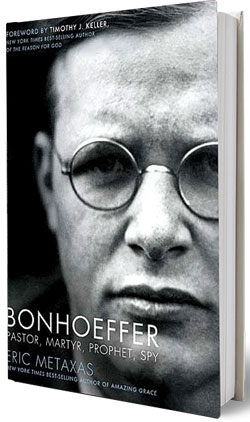 “Who am I? This or the other?
“Who am I? This or the other?
Am one person today and tomorrow another?
Am I both at once? A hypocrite before others,
And before myself a contemptible woebegone weakling?
Or is something still within me a beaten army
Fleeing in disorder from victory already achieved?
Who am I? They mock me, these lonely questions of mine.
Whoever I am, Thou knowest, O God, I am thine!”
~Dr. Dietrich Bonhoeffer
(The young German Pastor who withstood Hitler and was consequently executed for doing so.)
For David, he came to understand that he was the Shepherd of Israel. He understood that God had anointed him to be King over Israel. He accepted who he was. Who are you? It’s only in the pressure of adversity that a person’s level of integrity becomes apparent. Both Paul and David had to undergo severe testing of their respective identities. You will never know who you are unless you experience adversity and find yourself doing what you should be doing.
WHERE SHOULD I BE?
As well as accepting who he was, the apostle Paul came to recognise where he was to be.
We, however, will not boast beyond proper limits, but will confine our boasting to the field God has assigned to us, a field that reaches even to you.
Second Corinthians 10:13 NIV
He came to understand that he was an apostle to the Gentiles. David accepted that he was the King of Israel. Who is your ‘audience’? Are you where you should be?
HOW DO MY ABILITIES MAKE ME ME?
David had an ability to lead, fight, strategise, organise, and build – all necessary traits of a good king. Paul had an ability to pioneer, teach, train, raise support, and evangelise – all necessary traits of a good apostle. What abilities do you have? How do these abilities make you you? Are you developing these abilities? It’s when someone is trying to be someone they are not, in an environment where shouldn’t be, and attempting to do things they are not qualified to do, that they are not being a person of integrity.

Redemption is a beautiful word. It speaks of rescue/repair – but it goes way beyond this. In one sense it means to bring back to a better place. In other words, the thing being redeemed is now better because it has been redeemed. It is just not possible to become a person of integrity without being redeemed!
We have seen that David started out his career with some small integrity breaches. He had what appeared to be an untethered sexual drive. It appears that the prospect of being given a wife as a result of killing Goliath was at least a factor in him considering this challenge. We shortly afterwards observe him taking Abigail as his wife – while at the same time taking Ahinoam of Jezreel. But it didn’t end there. We famously think of David’s integrity breach growing into a serious character flaw when he committed adultery with Bathsheba (‘Bathshua’). Interestingly, this event occurred when David did not do what God had called and enabled him to do.
¶ In the spring of the year, the time when kings go out to battle, David sent Joab, and his servants with him, and all Israel. And they ravaged the Ammonites and besieged Rabbah. But David remained at Jerusalem.
Second Samuel 11:1
David’s character flaw was not dealt with until much later. Consider this obscure genealogical passage in First Chronicles 3 which reveals some of the extent to which David’s character flaw was untethering.
¶ These are the sons of David who were born to him in Hebron: the firstborn, Amnon, by Ahinoam the Jezreelite; the second, Daniel, by Abigail the Carmelite, the third, Absalom, whose mother was Maacah, the daughter of Talmai, king of Geshur; the fourth, Adonijah, whose mother was Haggith; the fifth, Shephatiah, by Abital; the sixth, Ithream, by his wife Eglah; six were born to him in Hebron, where he reigned for seven years and six months. And he reigned thirty-three years in Jerusalem. These were born to him in Jerusalem: Shimea, Shobab, Nathan and Solomon, four by Bath-shua, the daughter of Ammiel; then Ibhar, Elishama, Eliphelet, Nogah, Nepheg, Japhia, Elishama, Eliada, and Eliphelet, nine. All these were David’s sons, besides the sons of the concubines, and Tamar was their sister.
First Chronicles 3:1-9
David ended up having at least seven wives plus at least two concubines which resulted in at least him siring twenty children. Eventually David’s not-fully-tethered sexual expression resulted in the rape of his daughter, Tamar, by his son Amnon. This disastrous fruit of David’s character flaw resulted in many of family members dying. It was from this point that David encountered a new brokenness. From the depths of his brokenness he was redeemed. In a similar way, Saul of Tarsus did not become the apostle Paul until God had knocked him off his horse and blinded him. For the rest of his life it appears that Paul had some trouble with his eyes (which many scholars believe was his ‘thorn in the flesh’ [2Cor. 12:7]) – and was perhaps a constant reminder to him of his former life of pride. To be person of integrity necessarily involves those hidden breaches in your life coming to light, being exposed, experiencing the brokenness that results from this, the healing forgiveness of God, an acceptance of who we are called to be, and the redemption of our lives fit for God’s use.
JAMES J. BRADDOCK & INTEGRITY
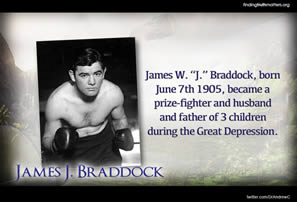 During the Great Depression of the twentieth century in the U.S.A., James Braddock was a young father of three small children struggling to put food on the table for his wife and children. James had an unusual ability to box. But in order to feed his family, he over-boxed and broke his right hand. In his first three years a prize fighter he had 44 bouts in which he won 40, lost 2 and drew 2. He was well on the way to becoming the number one contender for the World Heavyweight Champion. Then he broke his hand. Fearing the financial repercussions of disclosing this fact, he kept boxing. But in his next 33 bouts after this, he could only win 11 of them. Promoters no longer wanted to use him. Nearing the age of 30 he was now washed up. He struggled to get a job anywhere but a Dock manager (who was a fight fan) took sympathy on him and allowed him onto the docks as a casual labourer. The hours were long and the work was hard.
During the Great Depression of the twentieth century in the U.S.A., James Braddock was a young father of three small children struggling to put food on the table for his wife and children. James had an unusual ability to box. But in order to feed his family, he over-boxed and broke his right hand. In his first three years a prize fighter he had 44 bouts in which he won 40, lost 2 and drew 2. He was well on the way to becoming the number one contender for the World Heavyweight Champion. Then he broke his hand. Fearing the financial repercussions of disclosing this fact, he kept boxing. But in his next 33 bouts after this, he could only win 11 of them. Promoters no longer wanted to use him. Nearing the age of 30 he was now washed up. He struggled to get a job anywhere but a Dock manager (who was a fight fan) took sympathy on him and allowed him onto the docks as a casual labourer. The hours were long and the work was hard.
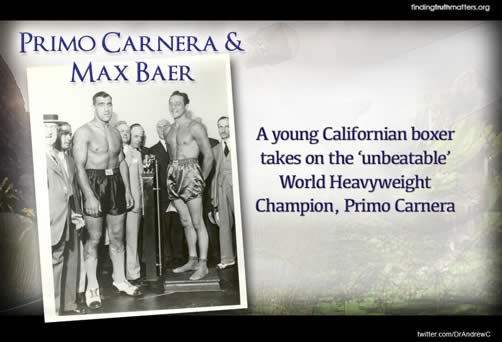 Meanwhile, the undisputed World Heavyweight Champion, Primo Carnera, was considered unbeatable. He was a powerful mountain of a man. But in 1934 he was challenged by the little known Max Baer from California. Baer was no physical match for much bigger and stronger Carnera. Their bout took place June 14th 1934 and has now gone down in the annals of boxing history as one of the most one-sided World Title contests ever fought. The referee had to mercifully stop the bout and award Baer the winner. Baer’s ruthlessness in the ring would see him go on to end the lives of at least two other boxers. Contenders became hard to come by for Baer.
Meanwhile, the undisputed World Heavyweight Champion, Primo Carnera, was considered unbeatable. He was a powerful mountain of a man. But in 1934 he was challenged by the little known Max Baer from California. Baer was no physical match for much bigger and stronger Carnera. Their bout took place June 14th 1934 and has now gone down in the annals of boxing history as one of the most one-sided World Title contests ever fought. The referee had to mercifully stop the bout and award Baer the winner. Baer’s ruthlessness in the ring would see him go on to end the lives of at least two other boxers. Contenders became hard to come by for Baer.
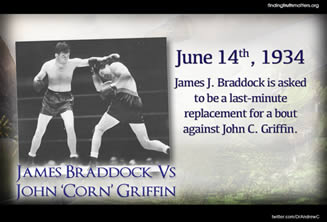 In 1935 the Number 1 contender to Baer, John “Corn” Griffin, was due to have a bout against a would-be contender in New York. But a few weeks out from this bout, the Number 1 contender’s opponent fell ill and couldn’t fight. The promoter was reluctant to refund the extensive ticket sales so looked for a fill in. Someone suggested that James Braddock lived nearby and might be coaxed back into the ring for a one-off bout if the money was right. With very little preparation, James Braddock stepped into the ring as the home-town ‘David’ ready to take on Goliath. But unlike the original David, Braddock had already confronted his flaws and been redeemed. The three years of working down on the docks had coincidentally strengthened his left arm as his right hand healed. The highly physical labour had resulted in him being stronger than he ever was. Working in the sea air had unwittingly had major beneficial effects upon his aerobic stamina. That night, the unexpected happened. James J. Braddock won. Another match was scheduled with another opponent. He won that one. Soon there was only one boxer he hadn’t beaten – the vicious Max Baer. Promoters offered him his chance at the World Title. His wife pleaded with him not to enter into the ring with Baer.
In 1935 the Number 1 contender to Baer, John “Corn” Griffin, was due to have a bout against a would-be contender in New York. But a few weeks out from this bout, the Number 1 contender’s opponent fell ill and couldn’t fight. The promoter was reluctant to refund the extensive ticket sales so looked for a fill in. Someone suggested that James Braddock lived nearby and might be coaxed back into the ring for a one-off bout if the money was right. With very little preparation, James Braddock stepped into the ring as the home-town ‘David’ ready to take on Goliath. But unlike the original David, Braddock had already confronted his flaws and been redeemed. The three years of working down on the docks had coincidentally strengthened his left arm as his right hand healed. The highly physical labour had resulted in him being stronger than he ever was. Working in the sea air had unwittingly had major beneficial effects upon his aerobic stamina. That night, the unexpected happened. James J. Braddock won. Another match was scheduled with another opponent. He won that one. Soon there was only one boxer he hadn’t beaten – the vicious Max Baer. Promoters offered him his chance at the World Title. His wife pleaded with him not to enter into the ring with Baer.
And June 13th 1935, James J. Braddock went 15 rounds with the unbeatable Max Baer, and won. He held the World Heavyweight Boxing Championship for two years until his retirement. His redemption as a boxer earned him the description from one sports writer as: The Cinderella Man.

King David’s integrity, his after God, and his subsequent ability to win the hearts of others, became his “key”. This key became the Biblical model for godly leadership and it reached its ultimate fulfilment, not in David, but the Christ.
¶ And to the angel of the church in Philadelphia write: ‘The words of the holy one, the true one, who has the key of David, who opens and no one will shut, who shuts and no one opens.
Revelation 3:7
Today you may feel that you have not been a person of integrity. You may feel that you have failed so miserably that there is no future for you. You may be hiding some dark secret that you hope to God no-one ever exposes. Integrity is possible. In fact, your brokenness is a pre-requisite to it! You may just now be beginning to realise who you are, what you are called to do, and the gifted abilities that God has given you to do it. If so, you are on your way to becoming a person of integrity and skill. Integrity brings with it a great wave of contentment. Perhaps instead of seeing your adversity as a hindrance to your integrity you might begin to see it as a vital means to achieving it! Will you commit yourself to being a person of integrity? If you are prepared to grow to your fullest integrity, it may require an act of humility – acknowledging your need for transcendent help that God nearly always chooses to deliver through others (1Peter 4:10).
As each has received a gift, use it to serve one another, as good stewards of God’s varied grace:
First Peter 4:10
© Andrew N. Corbett, 16th October 2013
https://www.findingtruthmatters.org
-
Sale!
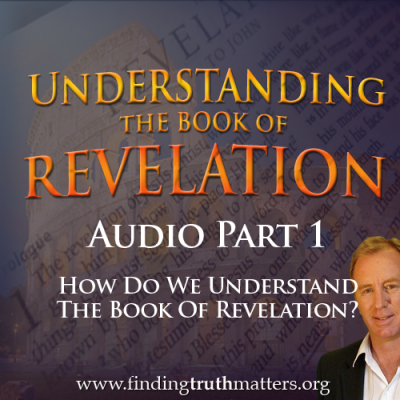
Understand The Book Of Revelation, Part 1 (Radio Edition)
Original price was: $1.25.$0.00Current price is: $0.00. -
Sale!

Living By Virtue, Part 4 – By Virtue of Generosity
Original price was: $1.25.$0.00Current price is: $0.00. -
Sale!
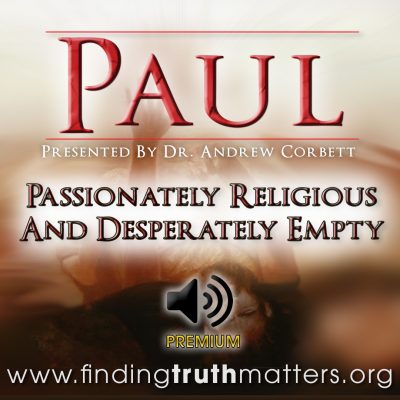
Paul Part 1, Premium Audio
Original price was: $1.75.$0.00Current price is: $0.00. -
Sale!
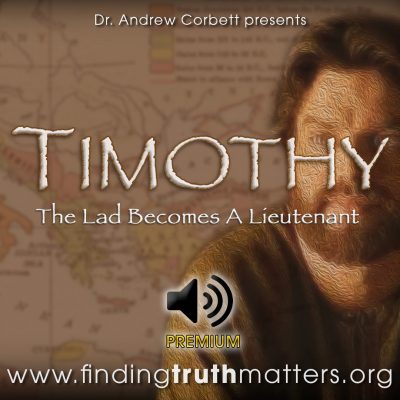
Timothy Part 2, Premium Audio
Original price was: $1.75.$0.00Current price is: $0.00.







































0 Comments